Impact Stories
| WAHTN Fellows & Grant Recipients - Where are they now? |
|---|
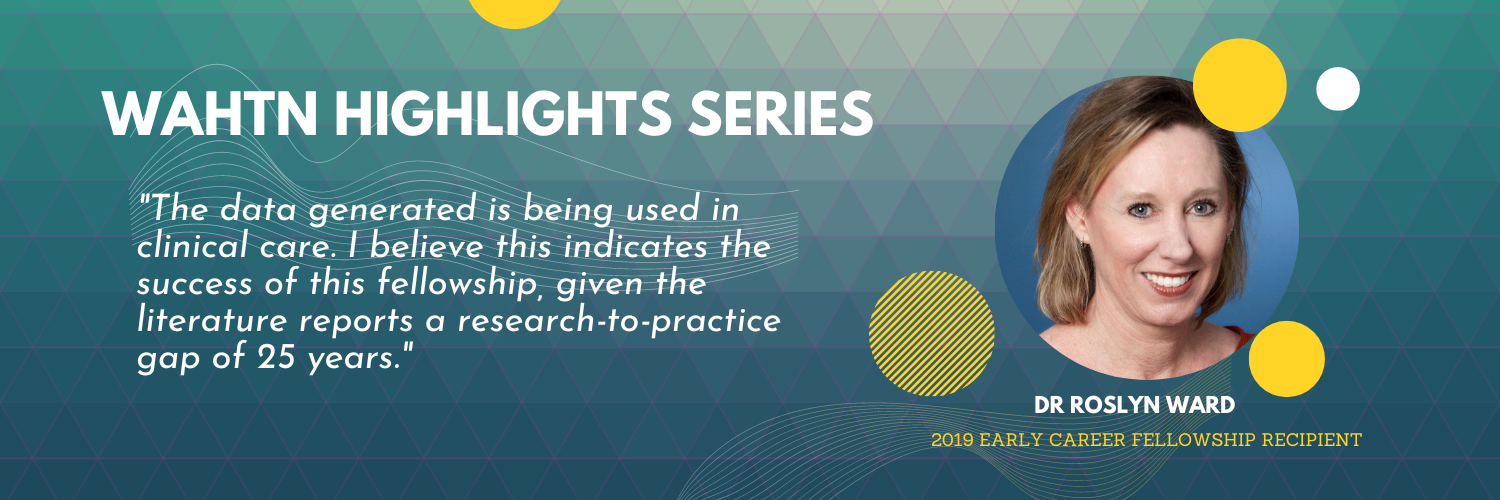 Dr Roslyn Ward of Curtin University, 2019 WAHTN Early Career Fellowship in Translational Health Research.
Roslyn’s Fellowship project, “B2: I Can Communicate”, was the first longitudinal study evaluating the developmental profile of early vocalisations, speech, and language development of infants with or at risk of Cerebral Palsy (CP).
The ability to communicate is a basic human right, critical to forming and maintaining social relationships as well as educational and career opportunities. It is currently reported 60-85% of children with Cerebral Palsy have communication problems, with 1 in 4 children unable to talk. Early diagnosis is critical to minimising the cascading consequences of communication impairment.
In this study, 18 children with CP and 18 typically developing children were followed at 3-monthly intervals from 6 to 18 months of age. Researchers, clinicians and stakeholders were involved throughout the project, with recommended changes in clinician practice and clinical pathways evaluated.
Data analyses showed significant group differences in both the type of infant vocalisations and the developmental trajectory of early speech/language development. Typically developing children displayed an increasing developmental trajectory over time, while the trajectory of development for CP was decreasing, indicating increasing communication impairment compared to typically developing children.
A clinical audit, as part of the project, was undertaken to assess implementation and translation into clinical practice. Data showed a significant decrease in the age at which children were assessed and change in assessment practices. This project therefore made a contribution to addressing the significant evidence-practice gap in the early diagnosis and management of communication disorders associated with CP, contributed to a data-driven knowledge base for clinicians and facilitated dialogue on building clinical care pathways.
The project was conducted within an integrated knowledge translation framework, intended not only to generate knowledge but to do so within a clinical environment so it could be put into practice. “The data generated is being used in clinical care. I believe this indicates the success of this fellowship, given the literature reports a research-to-practice gap of 25 years”, Roslyn shared.
Dr Roslyn Ward of Curtin University, 2019 WAHTN Early Career Fellowship in Translational Health Research.
Roslyn’s Fellowship project, “B2: I Can Communicate”, was the first longitudinal study evaluating the developmental profile of early vocalisations, speech, and language development of infants with or at risk of Cerebral Palsy (CP).
The ability to communicate is a basic human right, critical to forming and maintaining social relationships as well as educational and career opportunities. It is currently reported 60-85% of children with Cerebral Palsy have communication problems, with 1 in 4 children unable to talk. Early diagnosis is critical to minimising the cascading consequences of communication impairment.
In this study, 18 children with CP and 18 typically developing children were followed at 3-monthly intervals from 6 to 18 months of age. Researchers, clinicians and stakeholders were involved throughout the project, with recommended changes in clinician practice and clinical pathways evaluated.
Data analyses showed significant group differences in both the type of infant vocalisations and the developmental trajectory of early speech/language development. Typically developing children displayed an increasing developmental trajectory over time, while the trajectory of development for CP was decreasing, indicating increasing communication impairment compared to typically developing children.
A clinical audit, as part of the project, was undertaken to assess implementation and translation into clinical practice. Data showed a significant decrease in the age at which children were assessed and change in assessment practices. This project therefore made a contribution to addressing the significant evidence-practice gap in the early diagnosis and management of communication disorders associated with CP, contributed to a data-driven knowledge base for clinicians and facilitated dialogue on building clinical care pathways.
The project was conducted within an integrated knowledge translation framework, intended not only to generate knowledge but to do so within a clinical environment so it could be put into practice. “The data generated is being used in clinical care. I believe this indicates the success of this fellowship, given the literature reports a research-to-practice gap of 25 years”, Roslyn shared.
 Subscribe to keep up-to-date with WAHTN news, events, and funding opportunities. WAHTN Media and Communications – Hannah Vu (08 6151 0919) |
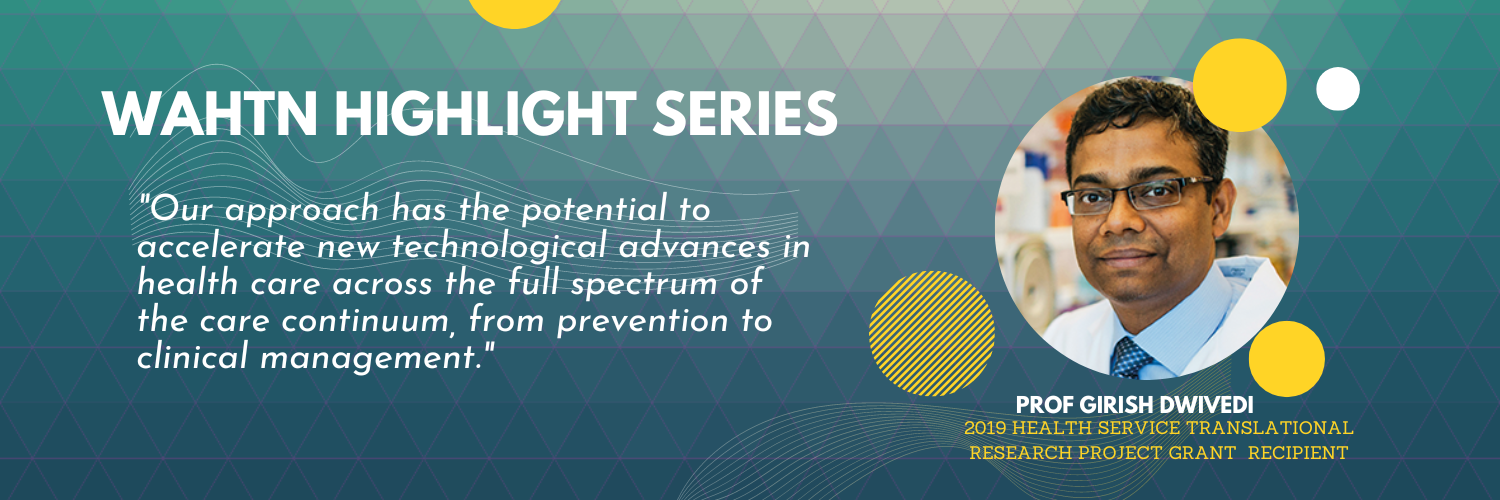 Professor Girish Dwivedi, 2019 Health Service Translational Research Project grant recipient
Professor Girish Dwivedi of the South Metropolitan Health Service, the Harry Perkins Institute of Medical Research and the University of Western Australia, explored the potential of Artificial Intelligence (AI) in medicine as one of the recipients of HSTRP funding in 2019.
His project, “High Performance Medicine through Artificial Intelligence in the Emergency Department”, aims to develop an AI-driven system that will give a personalised rating of the appropriateness of various advanced cardiovascular investigations for patients who have presented to the emergency department with chest pain.
After some initial delays due to COVID-19, the project is back on track with PhD students and early career researchers on board.
Girish and the project team – a diverse and multidisciplinary group of clinically active researchers – aim to develop advanced AI-driven clinical decision-making tools with the objective of reducing unwarranted variation in clinical care and outcome.
Professor Girish Dwivedi, 2019 Health Service Translational Research Project grant recipient
Professor Girish Dwivedi of the South Metropolitan Health Service, the Harry Perkins Institute of Medical Research and the University of Western Australia, explored the potential of Artificial Intelligence (AI) in medicine as one of the recipients of HSTRP funding in 2019.
His project, “High Performance Medicine through Artificial Intelligence in the Emergency Department”, aims to develop an AI-driven system that will give a personalised rating of the appropriateness of various advanced cardiovascular investigations for patients who have presented to the emergency department with chest pain.
After some initial delays due to COVID-19, the project is back on track with PhD students and early career researchers on board.
Girish and the project team – a diverse and multidisciplinary group of clinically active researchers – aim to develop advanced AI-driven clinical decision-making tools with the objective of reducing unwarranted variation in clinical care and outcome.
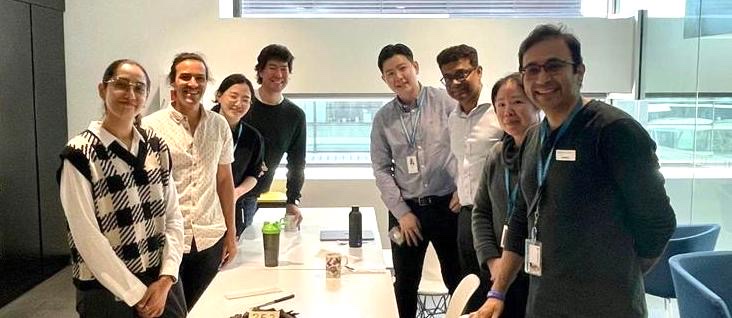 |
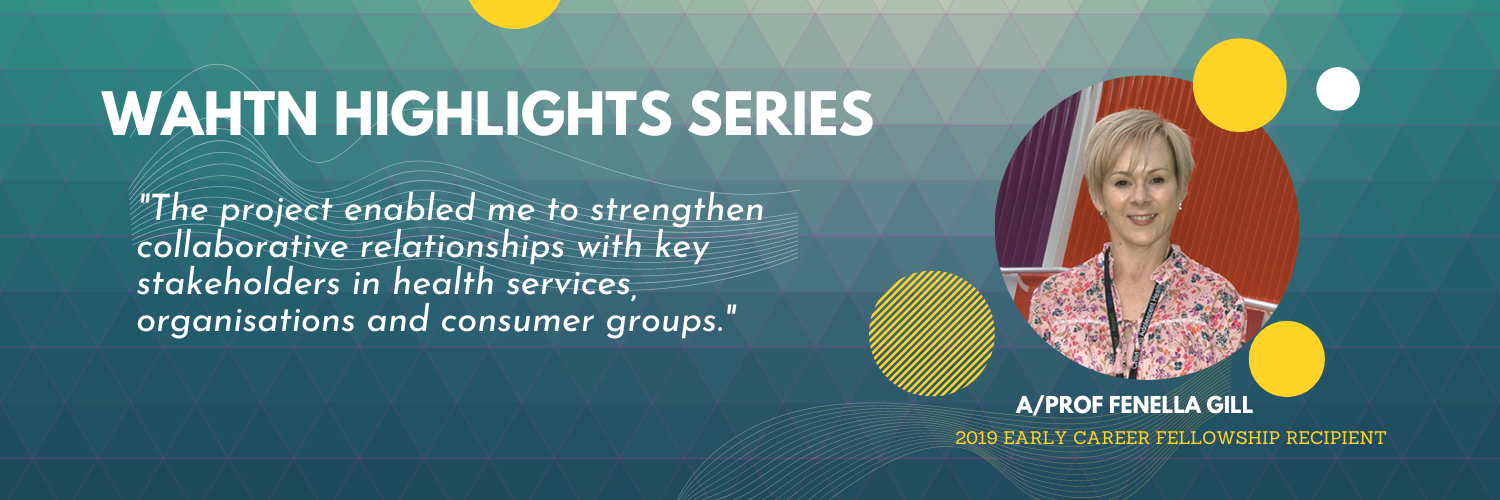 Dr Fenella Gill, 2019 Early Career Fellowship recipient
Over its first five years, WAHTN distributed more than $3.85 million from the Medical Research Future Fund (MRFF) to Early Career Fellowships and Health Service Translational Research Projects in Western Australia. In this series, we catch up with funding recipients to find out what they achieved and where it’s led them.
Dr Fenella Gill was one of 11 researchers awarded a 12-month WAHTN Early Career Fellowship in Translational Health Research
Fenella’s project, “Unifying systems for recognition and response to paediatric clinical deterioration in Western Australia”, addressed the lack of a uniform approach to recognising and responding to clinical deterioration for hospitalised children in WA – something that could contribute in failure to recognise or respond in a timely manner to critical changes in a child’s condition, potentially resulting in adverse outcomes.
The project aimed to develop an evidence based state-wide system for recognising and responding to clinical deterioration in WA paediatric settings inclusive of family participation and to evaluate the feasibility and factors necessary to ensure successful implementation.
Following an evidence review and stakeholder consultation, Fenella led co-production of a system named ESCALATION with a working group that included nurses, doctors, health consumers and a human factors principles expert.
Two years on, version 3.0 of the ESCALATION system (which had the addition of sepsis prompts and a sepsis escalation pathway) was implemented at Perth Children’s Hospital (PCH) and Broome Hospital, and the Department of Health is coordinating a state-wide rollout for v4.0. Fenella and the team refined the education and training resources and tested suitability for the state-wide rollout using clinical simulation research.
Fenella said the fellowship program was an opportunity to demonstrate her ability to lead large-scale implementation research. “I gained invaluable experience in leading a research team, working across health services and navigating multiple research ethics and governance processes. The project enabled me to strengthen collaborative relationships with key stakeholders in health services, organisations and consumer groups.”
Since completing the fellowship project in August 2020, Fenella has been continuing her research on paediatric inpatient and family experiences, safety and outcome in her role as Associate Professor at Curtin and PCH. Associate Professor Fenella Gill is also one of the Implementation Science Fellowships recipients, announced in May 2022 for her Paediatric 'Escalation' System. More information on this project is available at escalation.com.au
To stay update with her current research or achievements, you can find Dr Fenella Gill on LinkedIn and Twitter and at Curtin University.
Subscribe to keep up-to-date with WAHTN news, events, and funding opportunities.
WAHTN Media and Communications – Hannah Vu (08 6151 0919)
Dr Fenella Gill, 2019 Early Career Fellowship recipient
Over its first five years, WAHTN distributed more than $3.85 million from the Medical Research Future Fund (MRFF) to Early Career Fellowships and Health Service Translational Research Projects in Western Australia. In this series, we catch up with funding recipients to find out what they achieved and where it’s led them.
Dr Fenella Gill was one of 11 researchers awarded a 12-month WAHTN Early Career Fellowship in Translational Health Research
Fenella’s project, “Unifying systems for recognition and response to paediatric clinical deterioration in Western Australia”, addressed the lack of a uniform approach to recognising and responding to clinical deterioration for hospitalised children in WA – something that could contribute in failure to recognise or respond in a timely manner to critical changes in a child’s condition, potentially resulting in adverse outcomes.
The project aimed to develop an evidence based state-wide system for recognising and responding to clinical deterioration in WA paediatric settings inclusive of family participation and to evaluate the feasibility and factors necessary to ensure successful implementation.
Following an evidence review and stakeholder consultation, Fenella led co-production of a system named ESCALATION with a working group that included nurses, doctors, health consumers and a human factors principles expert.
Two years on, version 3.0 of the ESCALATION system (which had the addition of sepsis prompts and a sepsis escalation pathway) was implemented at Perth Children’s Hospital (PCH) and Broome Hospital, and the Department of Health is coordinating a state-wide rollout for v4.0. Fenella and the team refined the education and training resources and tested suitability for the state-wide rollout using clinical simulation research.
Fenella said the fellowship program was an opportunity to demonstrate her ability to lead large-scale implementation research. “I gained invaluable experience in leading a research team, working across health services and navigating multiple research ethics and governance processes. The project enabled me to strengthen collaborative relationships with key stakeholders in health services, organisations and consumer groups.”
Since completing the fellowship project in August 2020, Fenella has been continuing her research on paediatric inpatient and family experiences, safety and outcome in her role as Associate Professor at Curtin and PCH. Associate Professor Fenella Gill is also one of the Implementation Science Fellowships recipients, announced in May 2022 for her Paediatric 'Escalation' System. More information on this project is available at escalation.com.au
To stay update with her current research or achievements, you can find Dr Fenella Gill on LinkedIn and Twitter and at Curtin University.
Subscribe to keep up-to-date with WAHTN news, events, and funding opportunities.
WAHTN Media and Communications – Hannah Vu (08 6151 0919) |
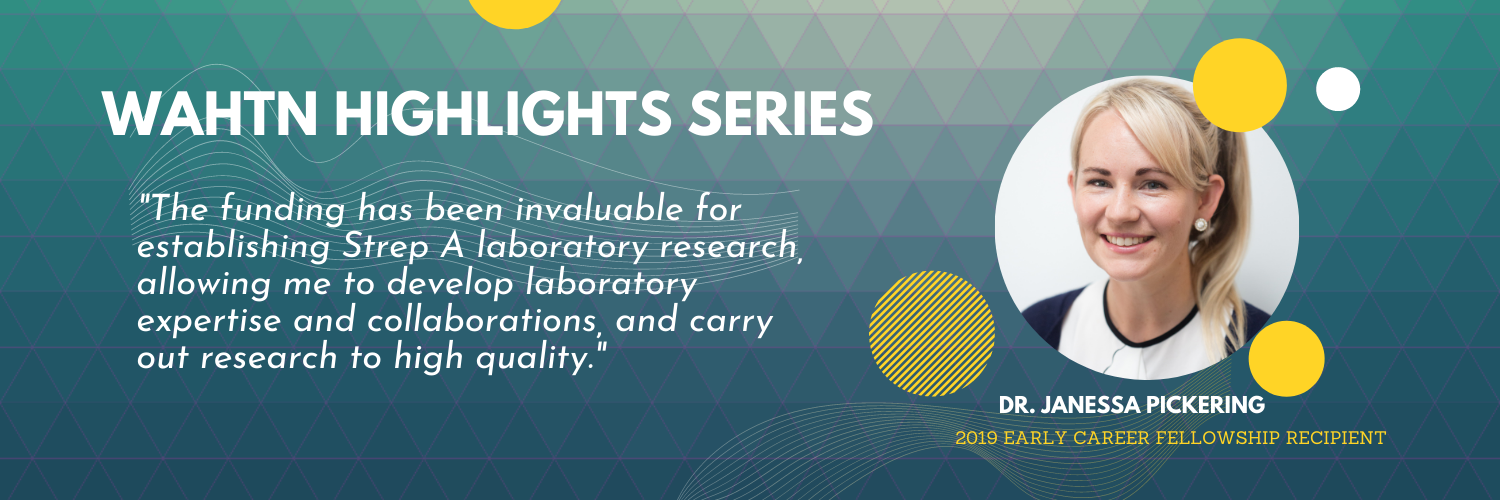 As one of 11 researchers awarded a 12-month WAHTN Early Career Fellowship in Translational Health Research, Dr Janessa Pickering successfully developed tools and protocols to accurately assess Strep A surveillance.
In her Fellowship project, “Developing laboratory diagnostics for Strep A carriage: an essential step to progress vaccine and acute rheumatic fever primary prevention”, Dr Pickering (in collaboration with A/Prof Asha Bowen, Prof Jonathan Carapetis, A/Prof Catherine Satzke and Prof Andrew Steer) determined the optimal way to store and handle throat swabs collected from children. Their new methods can be applied in low- and high-resource settings to measure the rates of Strep A infection and the impact of preventative measures including health policies and vaccinations. This study also discovered how best to disrupt Strep A cell walls, leading to optimised DNA extraction protocols which are now being used in surveillance studies in Australia. Based on the success of the project, Dr Pickering’s colleague A/Prof Asha Bowen adopted the methodology to determine the prevalence and incidence of Strep A in the cohort study she leads in the Kimberley. With the laboratory platform to culture Strep A in place, the Missing Piece surveillance study accurately quantifies the burden of Strep A in school children.
Additionally, the finalisation of research protocols for Strep A identification has led Dr Pickering to a new collaboration with the Australian Strep A Vaccine Initiative Surveillance (ASAVI) – an Australian-led initiative to progress Strep A vaccine development incorporating official partnerships between the Telethon Kids Institute, the Murdoch Children’s Research Institute and the National Aboriginal Community Controlled Health Organisation. ASAVI is funded by the Medical Research Futures Fund and philanthropic donors’ – including Open Philanthropy and the Leducq Foundation. Dr Pickering developed the microbial analysis protocols for the STAMPS urban pharyngitis surveillance study which will provide essential baseline epidemiology data to inform future ASAVI-led vaccine trials.
“This Translation Fellowship has significantly enabled the development of my early career research program which is now embedded within the END RHD Program at the Telethon Kids Institute,” Dr Pickering said. “The funding has been invaluable for establishing Strep A laboratory research, allowing me to develop laboratory expertise and collaborations, and carry out research to high quality.”
As one of 11 researchers awarded a 12-month WAHTN Early Career Fellowship in Translational Health Research, Dr Janessa Pickering successfully developed tools and protocols to accurately assess Strep A surveillance.
In her Fellowship project, “Developing laboratory diagnostics for Strep A carriage: an essential step to progress vaccine and acute rheumatic fever primary prevention”, Dr Pickering (in collaboration with A/Prof Asha Bowen, Prof Jonathan Carapetis, A/Prof Catherine Satzke and Prof Andrew Steer) determined the optimal way to store and handle throat swabs collected from children. Their new methods can be applied in low- and high-resource settings to measure the rates of Strep A infection and the impact of preventative measures including health policies and vaccinations. This study also discovered how best to disrupt Strep A cell walls, leading to optimised DNA extraction protocols which are now being used in surveillance studies in Australia. Based on the success of the project, Dr Pickering’s colleague A/Prof Asha Bowen adopted the methodology to determine the prevalence and incidence of Strep A in the cohort study she leads in the Kimberley. With the laboratory platform to culture Strep A in place, the Missing Piece surveillance study accurately quantifies the burden of Strep A in school children.
Additionally, the finalisation of research protocols for Strep A identification has led Dr Pickering to a new collaboration with the Australian Strep A Vaccine Initiative Surveillance (ASAVI) – an Australian-led initiative to progress Strep A vaccine development incorporating official partnerships between the Telethon Kids Institute, the Murdoch Children’s Research Institute and the National Aboriginal Community Controlled Health Organisation. ASAVI is funded by the Medical Research Futures Fund and philanthropic donors’ – including Open Philanthropy and the Leducq Foundation. Dr Pickering developed the microbial analysis protocols for the STAMPS urban pharyngitis surveillance study which will provide essential baseline epidemiology data to inform future ASAVI-led vaccine trials.
“This Translation Fellowship has significantly enabled the development of my early career research program which is now embedded within the END RHD Program at the Telethon Kids Institute,” Dr Pickering said. “The funding has been invaluable for establishing Strep A laboratory research, allowing me to develop laboratory expertise and collaborations, and carry out research to high quality.”
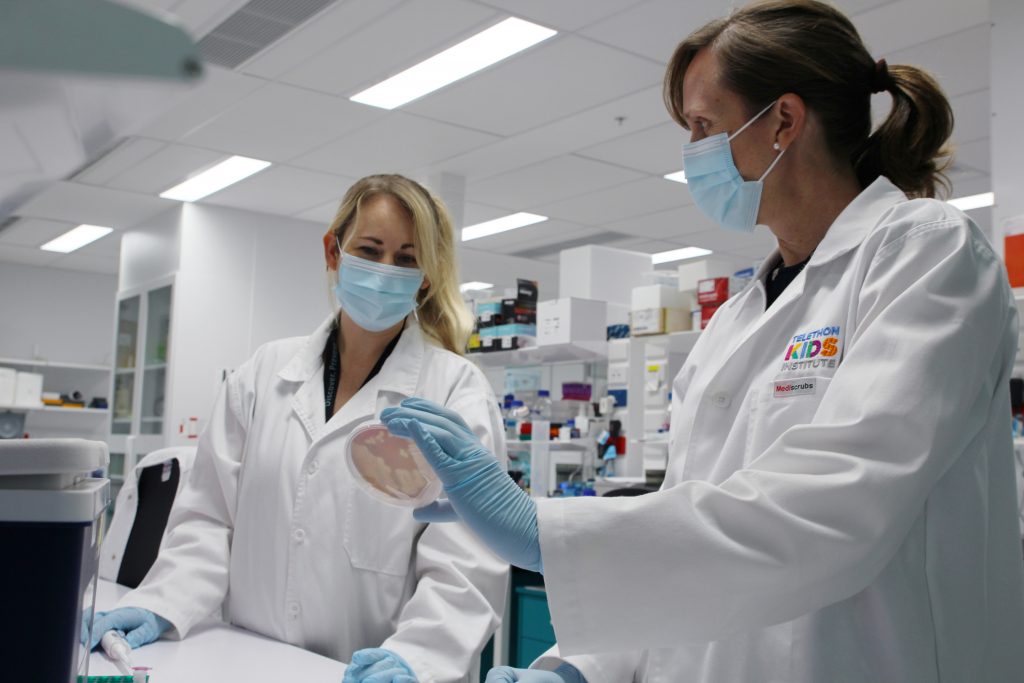 Following on from her success in the WAHTN Early Career Fellowship, Dr Pickering received a HOT NORTH Early Career Fellowship for 2020. Combined with the experience and mentoring she gained from her WAHTN Fellowship, she said this placed her in an excellent position to apply for future research funding and continue to work on reducing the burden of Strep A disease. Dr Pickering is now a deputy lead of the Group A Streptococcus Pathogenesis and Diagnostics team, which sits within the END RHD Program at the Telethon Kids Institute.
Dr Janessa Pickering can be found on LinkedIn and Twitter and at the Telethon Kids Institute
Subscribe to keep up-to-date with WAHTN news, events, and funding opportunities.
WAHTN Media and Communications – Hannah Vu (08 6151 0919)
Following on from her success in the WAHTN Early Career Fellowship, Dr Pickering received a HOT NORTH Early Career Fellowship for 2020. Combined with the experience and mentoring she gained from her WAHTN Fellowship, she said this placed her in an excellent position to apply for future research funding and continue to work on reducing the burden of Strep A disease. Dr Pickering is now a deputy lead of the Group A Streptococcus Pathogenesis and Diagnostics team, which sits within the END RHD Program at the Telethon Kids Institute.
Dr Janessa Pickering can be found on LinkedIn and Twitter and at the Telethon Kids Institute
Subscribe to keep up-to-date with WAHTN news, events, and funding opportunities.
WAHTN Media and Communications – Hannah Vu (08 6151 0919) |
As one of the 12 HSTRP recipients in 2019, Dr Wei-Sen Lam of the WA Country Health Service (WACHS) aimed to provide a solution to tackle the lack of clinical trials in rural areas through his project, “Teletrials in WA: A feasibility study to develop and pilot a TeleTrial framework to bring clinical trials closer to home for country patients”.
Dr Lam is the director for TeleTrials at WACHS and Head of Service of the medical oncology department at Fiona Stanley Hospital (FSH). He was the former Director of Medical Oncology at WACHS prior to his role in TeleTrials. He has been a principal investigator for several lung cancer trials and is an executive committee member of the Clinical Oncology Society of Australia (COSA) Rural and Regional Council. Dr Lam shared “As a medical oncologist, I have seen patients live longer with drugs available through clinical trials. Unfortunately for country patients, it is harder for such patients to have access to clinical trials due to travel commitments and time away from home. That’s why we wanted to address this issue through our research”.
COSA developed an Australasian Tele-Trial Model (ATM) which outlines a number of key considerations for using telehealth to increase access to clinical trials for people with cancer in rural and remote locations. This model provides an opportunity to overcome disparities in cancer survival and mortality rates between country patients and their metropolitan counterparts; it is estimated that 67 lives could be saved each year if country WA was to reduce cancer death rates to the metropolitan average.
With the support of WAHTN grant, Dr Lam’s project developed a framework and identified barriers for the implementation of TeleTrials in WA. The project engaged key stakeholders including WA Department of Health, South Metro Health Service, and Great Southern Health Service.
This project was the first step towards developing a pilot TeleTrial in Albany. The WAHTN grant allowed Dr Lam and his TeleTrial team to collaborate with states and territories to improve regional and rural access to clinical trials. The Australian TeleTrial Program, led by Department of Health, Queensland, helped secure $75.2 million in funding from a Commonwealth MRFF Grant in 2020 to run clinical trials using the TeleTrial model. A proportion of this funding will help Western Australia develop a Regional Clinical Trial Coordinating Centre (RCCC) and regional satellite sites to allow greater access to clinical trials.
“Without the WAHTN funding, we would not be able to assess the barriers to develop TeleTrials in Western Australia. We would also not be able to be involved with the Australian TeleTrials Program. I am excited with the next phase of this project and through TeleTrials, regional patients will have greater access to novel treatments and approaches to care” Dr Wei-Sen Lam said.
In the second half of 2022, Dr. Lam and his team will be commencing TeleTrials which allow regional and remote patients access to novel therapies and investigations.
Dr Wei-Sen Lam can be found on LinkedIn and Twitter
Subscribe to keep up-to-date with WAHTN news, events, and funding opportunities.
WAHTN Media and Communications – Hannah Vu (08 6151 0919)
|

 Over its first five years, WAHTN distributed more than $3.85 million from the Medical Research Future Fund (MRFF) to Early Career Fellowships and Health Service Translation Projects in Western Australia. In this series, we catch up with funding recipients to find out what they achieved and where it’s led them.
Over its first five years, WAHTN distributed more than $3.85 million from the Medical Research Future Fund (MRFF) to Early Career Fellowships and Health Service Translation Projects in Western Australia. In this series, we catch up with funding recipients to find out what they achieved and where it’s led them.